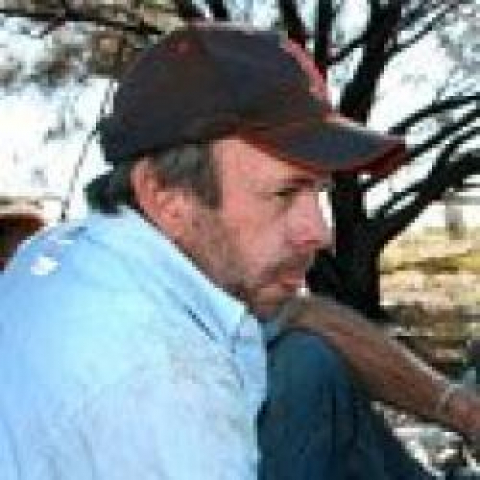Douglas Bird
Professor of Anthropology

-
323B Carpenter Building
University Park, PA 16802 - dwb5537@psu.edu
- 814-863-1096
Research Summary
Livelihood decisions and habitats, exploring the dynamics of human subsistence practices, their role in ecosystem function, and their archaeological implications in Australia and Western North America.
Huck Affiliations
Most Recent Publications
Correction to: Seed dispersal by Martu peoples promotes the distribution of native plants in arid Australia (Nature Communications, (2024), 15, 1, (6019), 10.1038/s41467-024-50300-5)
Rebecca Bliege Bird, Douglas W. Bird, Christopher T. Martine, Chloe McGuire, Leanne Greenwood, Desmond Taylor, Tanisha M. Williams, Peter M. Veth, 2024, Nature Communications
Seed dispersal by Martu peoples promotes the distribution of native plants in arid Australia
Rebecca Bliege Bird, Douglas W. Bird, Chloe McGuire, Christopher T. Martine, Chloe McGuire, Tanisha Williams, Chris Martine, Leanne Greenwood, Peter Veth, Desmond Taylor, Tanisha M. Williams, Peter M. Veth, 2024, Nature Communications
Why Do Humans Hunt Cooperatively?: Ethnohistoric Data Reveal the Contexts, Advantages, and Evolutionary Importance of Communal Hunting
Eugene Morin, Douglas Bird, R Bird, Bruce Winterhalder, 2024, Current Anthropology on p. 876-921
Foraging strategies
Jeremy Koster, Douglas Bird, 2024, on p. 48-75
The role of theory and ethnographic analogies in understanding paleoindian obsidian acquisition, mobility, and mating strategies in the Great Basin
Zeanah, Codding, D , Rebecca Bliege Bird, McGuire, Jones, Elston, 2023,
Resource Acquisition Risk and the Division of Labor: Austral Lessons for Hunter-Gatherer Archaeology
Brian F. Codding, Rebecca Bliege Bird, David W. Zeanah, Douglas W. Bird, 2023, on p. 129-146
Regenerative landscape design: an integrative framework to enhance sustainability planning
E Smithwick, Jennifer Baka, D Bird, Christopher Blaszscak-Boxe, C Blaszczak-Boxe, C Cole, J Fuentes, Sarah Gergel, Leland Glenna, C Grady, A Graefe, C Hunt, L Iulo, Carter Hunt, L Iulo, Jason Kaye, Klaus Keller, J Kaye, Klaus Keller, 2023, Conservation Ecology
A collaborative agenda for archaeology and fire science
Grant Snitker, Christopher Roos, Alan Sullivan, S. Maezumi, Douglas W. Bird, Michael Coughlan, Kelly Derr, Linn Gassaway, Anna Klimaszewski-Patterson, Rachel Loehman, 2022, Nature Ecology and Evolution on p. 835-839
Deconstructing Hunting Returns: Can We Reconstruct and Predict Payoffs from Pursuing Prey?
Eugène Morin, Douglas Bird, Bruce Winterhalder, Rebecca Bliege Bird, 2021, Journal of Archaeological Method and Theory on p. 1-63
Mass procurement and prey rankings: insights from the European rabbit
Eugène Morin, Rebecca Bliege Bird, Douglas Bird, 2020, Archaeological and Anthropological Sciences
Most-Cited Papers
Behavioral ecology and the future of archaeological science
Brian F. Codding, Douglas W. Bird, 2015, Journal of Archaeological Science on p. 9-20
Human behaviour as a long-term ecological driver of non-human evolution
Alexis P. Sullivan, Douglas W. Bird, George H. Perry, 2017, Nature Ecology and Evolution
Variability in the organization and size of hunter-gatherer groups: Foragers do not live in small-scale societies
Douglas W. Bird, Rebecca Bliege Bird, Brian F. Codding, David W. Zeanah, 2019, Journal of Human Evolution on p. 96-108
Aboriginal burning promotes fine-scale pyrodiversity and native predators in Australia's Western Desert
Rebecca Bliege Bird, Douglas W. Bird, Luis E. Fernandez, Nyalanka Taylor, Wakka Taylor, Dale Nimmo, 2018, Biological Conservation on p. 110-118
A landscape architecture of fire: Cultural emergence and ecological pyrodiversity in Australia’s Western Desert
Douglas W. Bird, Rebecca Bliege Bird, Brian F. Codding, Nyalangka Taylor, 2016, Current Anthropology on p. S65-S79
Fire mosaics and habitat choice in nomadic foragers
R Bliege Bird, Rebecca Bliege Bird, Chloe McGuire, Douglas W. Bird, Michael Price, David Zeanah, Dale Nimmo, 2020, Proceedings of the National Academy of Sciences of the United States of America on p. 12904-12914
The life history of human foraging: Cross-cultural and individual variation
Jeremy Koster, Richard McElreath, Kim Hill, Douglas Yu, Glenn Shepard, Shepard, Glenn, Jr., Van Vliet, Nathalie, Nathalie Van Vliet, Michael Gurven, Benjamin Trumble, Rebecca Bliege Bird, R Bliege Bird, Douglas Bird, Brian Codding, Lauren Coad, Luis Pacheco-Cobos, Bruce Winterhalder, Karen Lupo, Dave Schmitt, Paul Sillitoe, Margaret Franzen, Michael Alvard, Vivek Venkataraman, Thomas Kraft, Kirk Endicott, S Beckerman, Stuart Marks, Thomas Headland, Margaretha Pangau-Adam, Anders Siren, Karen Kramer, Russell Greaves, Victoria Reyes-García, Victoria Reyes-Garcia, Maximilien Gueze, Maximilien Guèze, Romain Duda, Álvaro Fernández-Llamazares, Alvaro Fernandez-Llamazares, Sandrine Gallois, Lucentezza Napitupulu, Roy Ellen, John Ziker, Martin Nielsen, Elspeth Ready, Christopher Healey, Cody Ross, 2020, Science advances
Shellfishing and human evolution
Richard G. Klein, Douglas W. Bird, 2016, Journal of Anthropological Archaeology on p. 198-205
People, El Niño southern oscillation and fire in Australia: Fire regimes and climate controls in hummock grasslands
Rebecca Bliege Bird, Douglas W. Bird, Brian F. Codding, 2016, Philosophical Transactions of the Royal Society B: Biological Sciences
Subsistence Transitions and the Simplification of Ecological Networks in the Western Desert of Australia
Stefani A. Crabtree, Douglas W. Bird, Rebecca Bliege Bird, 2019, Human Ecology on p. 165-177
News Articles Featuring Douglas Bird
Oct 10, 2024
Landscape effects of hunter-gatherer practices reshape idea of agriculture
Indigenous hunter-gatherer practices play key role in plant dispersal, genetic diversity and conservation, according to new research led by Penn State anthropologists.
Full Article
Nov 06, 2023
Collaborative landscape design approach may improve resiliency, human well-being
A newly proposed landscape stewardship framework may lead to a more resilient and adaptable environment and improved quality of life for people.
Full Article
Jun 12, 2023
Penn State announces tenure-line faculty promotions, effective July 1, 2023
The following is a list of academic promotions for tenured and tenure-line faculty members at Penn State, effective July 1, 2023.
Full Article
Dec 18, 2019
Playing with tools—and weapons—was a ‘normal’ part of prehistoric childhood
Prehistoric children may have been cherished by their parents—but until recently, they’ve been neglected by many archaeologists, who assumed that childhood is simply about toys and games. Now, a new study adds to the growing literature that prehistoric children were hard workers, who learned from an early age to use the weapons and tools that would help them with the rigors of adulthood.
Full Article
Feb 08, 2019
Aboriginal Hunters’ Fires Help Restore an Australian Desert
A study of how the Martu shaped their land presents an example where humans seem to benefit an environment perceived as wilderness.
Full Article